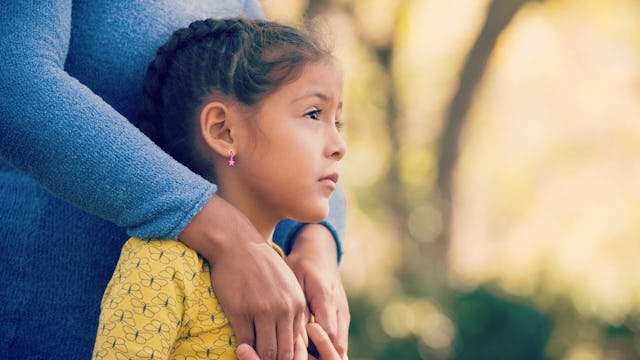Anxiety In Girls Has Increased Over 55%

I first started having anxiety attacks in my late teens. I was 19, and it was around the time of my father’s death. They always happened in the evenings, right when I was trying to go to sleep. It felt like there was a tremendous weight in my stomach, and no matter what I did, what I told myself, I felt terrified. But there wasn’t anything to be terrified about. I was home, in my bed.
Everything changed after that. Anxiety began to consume everything I did: my schedule, exercise, diet, and social interactions — all of it revolved around avoiding an anxiety attack. I dropped out of college, and I blew through my savings seeing doctors. It wasn’t until I was in my 30s that I was actually diagnosed with obsessive-compulsive disorder.
But none of it was nearly as scary as when my daughter started to show signs of anxiety.
I have two daughters, and the youngest is four, so it’s a little too early to tell with her. But my oldest daughter, Norah, is nine, and she’s already a little ball of anxiety, particularly when it comes homework, testing, and friends.
As if my observations weren’t alarming enough, according to Lisa Damour, Ph.D, and author of the New York Times Bestseller Under Pressure, the number of girls who said that they often felt nervous, worried, or fearful jumped 55% from 2009 to 2014, while the number of adolescent boys experiencing anxiety has remained unchanged.
I’m with you: that increase gave me pause, too. I couldn’t help but look at my own daughter — who is only nine and already starting to show signs of anxiety — and wonder if her experience will be worse than my own. Damour told Scary Mommy there really isn’t one single reason for the increase in anxiety among girls. What’s more pressing isn’t the increase, but how parents and children respond to it.
“Anxiety can, and does, grow out of control, [but] anxiety is a normal, protective human function — it serves as an alarm system that alerts us to threats around us… most of the time it serves as a useful ally,” Damour said. “It alerts us — perhaps several times a day — that we need to pay attention to the choices we’re making. If we paint anxiety as invariably unhelpful, girls will become anxious about even being anxious.”
This idea that anxiety isn’t all bad, but can actually be helpful, is at the center of Under Pressure. As an anxiety suffer, it’s a serious flip on what it means to live with an anxiety disorder. I don’t know how many of you reading this have experienced generalized anxiety, but I can tell you from personal experience it is usually far from helpful. At it’s worst it can literally shut you down, and 90% of what I have learned in therapy are ways to shut off the anxiety — but never once have I learned useful ways to use it, or how to accept it as a beneficial part of my existence.
So how do we, as parents, help our daughters understand the benefits of stress and anxiety? Well, that’s a good question and Damour had something really interesting to say about it. She likens “mental stress to physical stress,” and just like how someone builds muscle by lifting weights, we as humans develop intellectual and emotional strength by doing hard academic work and weathering difficult life circumstances. When working with girls suffering from anxiety, Damour encourages girls to view their anxiety as a friend.
“For example, if they arrive at a party and feel anxious, perhaps their nerves are letting them know that the party is too wild,” she said. “And if they become tense when they’re about to post something unkind online, that’s their anxiety asking them to reconsider.”
In other words, rather than trying to fight the anxiety, she suggests teaching our daughters to ask themselves: “What is my anxiety trying to tell me?”
Now naturally, there are situations in which an anxiety disorder is far too much for a parent to help manage. But as a father of daughters, I do wonder what that actually looks like. I know that my daughter has anxiety, but on the whole, we have been able to help her manage it. But where is the breaking point, and when should we as parents start to seek professional help or medication?
According to Damour, the real point of concern is when anxiety “starts to interfere with a girl’s physical health, or with her emotional, social, or intellectual growth. For example, a girl shouldn’t feel so stressed that she suffers from stomachaches and headaches. And she shouldn’t feel so anxious that she’s too fearful to enjoy her friends or face her schoolwork.”
The tipping point is when anxiety reaches a level that it starts to prevent our daughters from living normal healthy lives. But if there is one serious take-away from all this, it’s that although girls are suffering from more anxiety, if we look at it through the right lens, anxiety doesn’t have to be a solely a hinderance. It can actually be harnessed in beneficial ways.
In many cases, helping our daughters to feel what they are feeling, and rather than fight it, ask themselves “Why am I feeling this way?” and “What is it trying to tell me?”, they will ultimately gain control over their anxiety. And that, my friends, is a pretty powerful thing.